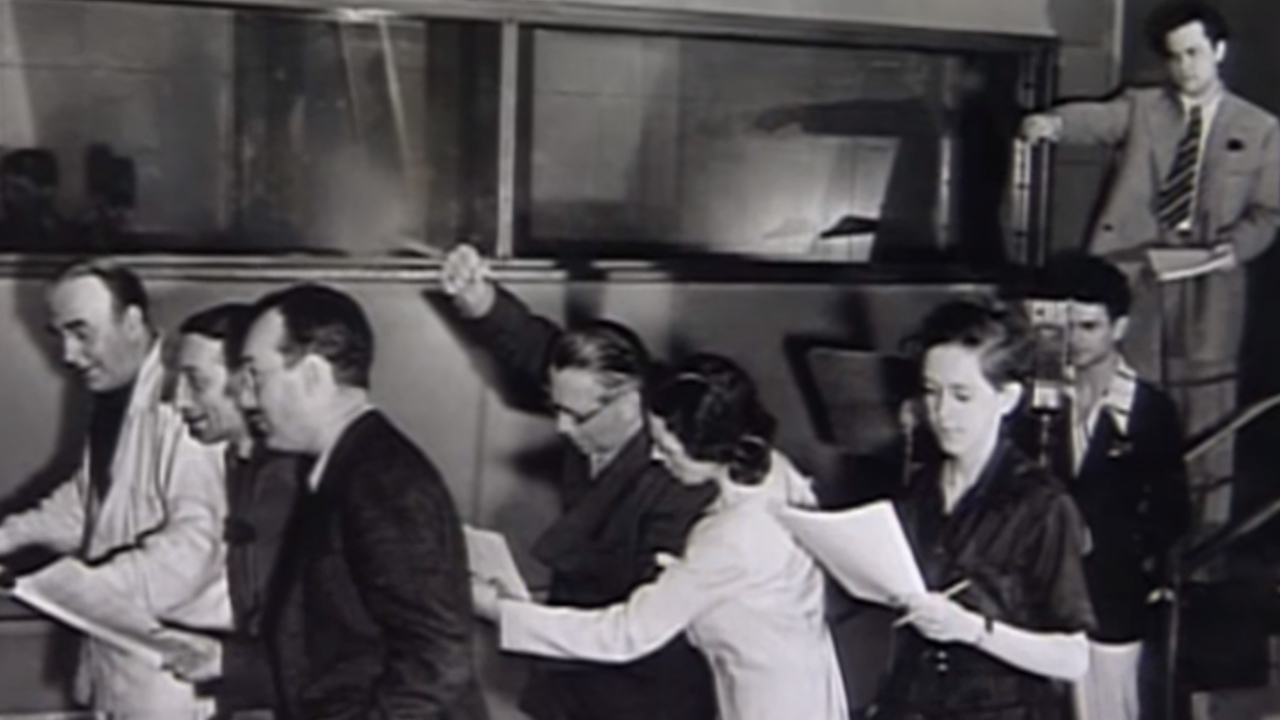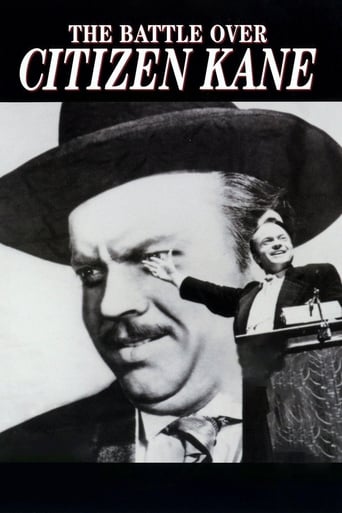gavin6942
Documentary about the battle between Orson Welles and William Randolph Hearst over Welles' "Citizen Kane" (1941). Features interviews with Welles' and Hearst's co-workers also as a relatively complete bio of Hearst.This documentary covers two things. One is the creation of "Citizen Kane" and the troubles that Orson Welles went through to get people to see it. This is covered fairly well, and for a fictional version of the story people can watch "RKO 281" which is based on this documentary.The other part is just as interesting, and maybe even more so: the biography of William Randolph Heart. While a towering figure in his day and at the time "Citizen Kane" came out, he has left the public consciousness. Do half of the people in America even know who he is? Probably not. And yet he had a profound effect on journalism and culture. He should be celebrated.
Michael_Elliott
Battle Over Citizen Kane, The (The American Experience) (1996) *** (out of 4) Season eight of The American Experience featured this documentary about the making of Orson Welles Citizen Kane, which would cause the director to do battle with William Randolph Hearst, the man Kane is based on. There's one huge problem with this film and that's that the film takes way too much time to dig into the actual making of the movie. We spend about an hour getting to know both Welles and Hearst, which is fine but I think too much time is spent here. We learn how Hearst ended up making his fortune (as well as losing) and how Welles became an overnight sensation with The War of the Words radio show. The most interesting aspects happen when we get to the making of the film and how Welles was running out of time to get a movie on the screen as many felt he'd never film anything. When the actual battle starts between the two men it's rather shocking and perhaps sad that neither Welles or Hearst had the decency to try and meet with one another to settle this thing instead of letting it take both of them over. The even sadder thing is that the movie Citizen Kane ended up being a bio of Welles as he ended up just like the character. I've often wondered if Welles got lost in the Kane character or perhaps he was the Kane character and this documentary makes it seem like he was the Kane character.
MisterWhiplash
Here is a special kind of documentary. It's surprising that it got nominated for an Oscar for best documentary, as it is from what I've seen in the DVD as being a made-for-TV affair (provided by annual financial support from "Viewers like you"). But on those standards it's one of the best from the 90's. Here is a study, not too long and not too short, about not only the history behind the feud that ensued between William Randolph Hearst and Orson Welles, but really about the two men themselves and how the best thing to come out of it all was the film. As it stands with history in present times, the real facts are interesting enough, yet is more for a selective audience who'll take the time to read books on the subject(s) or watch the documentaries. And if a fictional narrative on celluloid comes out, that may (or may not) become a basis for how that history is seen in the following generations who've never heard of the real stories. Citizen Kane is not a down-to-the-line biographical take on Hearst's jump to fame and his descent into his 'kingdom' of sorts, and it shouldn't have been (although, and this documentary confirms it, certain explicit details were taken from Hearst's life, which even Welles in interviews considers "dirty tricks").So like all good PBS-style documentaries, the filmmakers aren't content with merely showing the making of Kane and the battle over it (there's the dramatization- RKO 281- for that). It goes into the details of the two subjects lives, and an almost compare/contrast format of their claims to fame and power, however gargantuan &/or precious it was. Hearst grew up in what one of the interviewees calls a "19th century mind-set", where what he had was all his, no matter how he got it. It's of true fascination for someone from the end of the 20th century into the 21st century to see the brilliance behind the hubris; Hearst did in fact create the first sort of magazine that today is considered like an Enquirer or a Star magazine, only juicier and fresher to a sensitized audience. He creates an empire, tries to run for Government and fails, and then focuses all of his attentions on Marion Davies, a comic actress whom he nearly moved buildings for.His story is inter-cut wonderfully with Orson Welles's rise to fame. Anyone who knows just a little about Welles knows the hallmark War of the Worlds broadcast which, coincidentally like Hearst, capitalized on the public's pre-World War judgments. But un-like Hearst, who was painted as courteous, but also domineering and God-like (and Welles could be both of those things), Welles's control could get fierce, and difficult, but always for the results on stage or on the radio. Welles came almost 'out of nowhere', and says himself that he rarely heard a discouraging word. That is, until he reached New York, where he became one of the first celebrities to get a hotbed of controversy laid on his daring in entertainment and off. He revolutionized the theater (Macbeth and King Lear are mentioned, but wisely also the reverse power of the flops for Welles), and then radio, and got the most delicious film contract since Charlie Chaplin. When he hooked up with writer and Hearst's San Simian frequenter Herman Manciewicz, the ball got rolling on his first Hollywood picture.For some, this is where the real interest may kick in (likely more for film buffs than regular history aficionados), as Hearst threatened everything but a gun to the studio's executives to squash the film that alluded to so much about his personal life (one doesn't even need to mention 'Rosebud'). Although this part of the film seems to go by a little faster than the bulk of the film, it's of not flaw. Because of the time spent analyzing these two unique mavericks in their fields, one can see almost why this had to happen. It was just as personal and important for Hearst to create his empire as it was for Welles to make his film. There were, of course, many things that were Welles, not Hearst, in the picture, and that adds to its appeal. The film is also excellent as it doesn't shy from pointing out as much as what went wrong as went right; Welles's career would never be the same after that film, and Hearst was already on his way down after the battle was over (one person remarked to Welles after the movie opened up "quit now, quite while you're ahead). It should prove a great viewing for 'Kane' and Welles fans, and those who have not much an interest in him may still have that PBS doc bug going for the Hearst parts of the story.
jaybabb
-Maybe Spoilers herein-This film is a documentary about the conflict Between Orson Welles & William Randolph Hearst over the movie "Citizen Kane." There are interviews with many of the people involved with the film. Hearst was a powerful newspaper publisher who sensationalized the news. Many of the stories in his papers were made up. Welles was a radio and theatrical producer who also loved sensationalism. His plays & radio programs were like nothing else seen at the time. His "War of the worlds" broadcast scared the living daylights out of people since it sounded so real. Both men had at least one characteristic in common: They both believed that the ends justify the means. This is how they became successful and how in the end-destroyed themselves and each other.I have two thoughts regarding this battle: 1. I believe that if Hearst wouldn't have raised a racket over the film, The movie would have been destroyed. Because, People would not believe that Hearst was the kind of man Welles portrays. However, since he did raise a racket people wondered if the events depicted in "Citizen Kane" are true. Otherwise, he wouldn't have raised a racket. 2. These two men were their own worst enemies. There lifestyles and The way they conducted business would eventually come back to haunt them and it did. If you fly too high too soon, you will crash-what goes up MUST COME DOWN! The film "Citizen Kane" set these two on a collision course-they did 15 rounds in the ring and killed each other in the process.Both the newspaper and film industries can learn many lessons.1. The newspaper industry: Never let one man have that much control. There must be accountability here-It is irresponsible to make up stories about living people. In many cases(As he did with Orson Welles)if he didn't like you it was not pretty. This is not what the founding fathers had in mind when they gave us freedom of the press.2. The film industry: Never EVER give complete control to one man. While Welles made a brilliant film, it was about a real living person. Regardless how one feels about Hearst, the fact is it is irresponsible to portray him the way he did in the film.In short-another way of saying this for both: NEVER LET THE IMMATES RUN THE ASSYUM!!The only winner in this battle is the film itself. Perhaps Welles could have at least a little consolation over the fact-that this film is now considered one of the greatest films of all time. And in this day of the DVD format-this film will be forever Preserved. Thank God for that!


